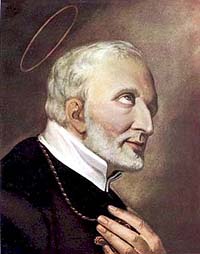Bilocation
Bilocation is a term used to describe the phenomenon where an individual or object is reported to be located in two distinct places at the same time. The concept of bilocation is found in various religious, mystical, and paranormal contexts and has been reported throughout history in numerous cultures and belief systems. It is often associated with saints, spiritual masters, and practitioners of certain mystical traditions.
Overview[edit | edit source]
Bilocation is considered a type of paranormal phenomenon. It involves cases where a person is said to simultaneously occupy two separate locations, which can be miles apart. This phenomenon is not just limited to humans; it has also been attributed to inanimate objects in various folklore and mystical traditions. Bilocation is different from teleportation in that it implies the simultaneous presence in two places, rather than the instant relocation from one place to another.
Historical Accounts[edit | edit source]
Throughout history, there have been numerous accounts of bilocation. Many of these are associated with Christian saints and mystics. For example, Saint Padre Pio, a 20th-century Italian priest, is one of the most famous modern examples of someone reported to have the ability of bilocation. Historical texts and testimonies from various individuals suggest that Padre Pio was seen in different locations at the same time, often in the context of providing guidance or performing miracles.
Another notable figure is Alphonsus Liguori, an 18th-century bishop and doctor of the Church, who is said to have appeared in two places during a papal conclave in Rome, while he was physically in a different location.
Explanations and Beliefs[edit | edit source]
The explanations for bilocation vary widely depending on the cultural and religious context. In some religious traditions, bilocation is seen as a miracle or a sign of sanctity. Mystical and esoteric teachings might interpret it as an advanced spiritual or psychic ability, indicating a high level of spiritual attainment or enlightenment.
From a scientific perspective, bilocation is generally regarded with skepticism. Explanations in the realms of psychology and parapsychology often suggest that reports of bilocation may be attributed to hallucinations, mistaken identity, or fraud. Some theories propose that bilocation experiences could be related to quantum mechanics or the multiverse theory, although these ideas are speculative and not widely accepted in the scientific community.
Cultural Significance[edit | edit source]
Bilocation has a significant place in the folklore and spiritual traditions of many cultures. In addition to its prominence in Christianity, similar concepts can be found in Hinduism, Tibetan Buddhism, and among the shamanic practices of indigenous peoples. These traditions often view bilocation as a manifestation of the spiritual or mystical capabilities of the human mind and spirit.
In Popular Culture[edit | edit source]
Bilocation has also been a popular theme in literature, film, and television, often portrayed as a supernatural ability or a mysterious phenomenon that drives the plot of stories involving mystery, fantasy, or horror.
See Also[edit | edit source]
This article is a paranormal-related stub. You can help WikiMD by expanding it!
Search WikiMD
Ad.Tired of being Overweight? Try W8MD's physician weight loss program.
Semaglutide (Ozempic / Wegovy and Tirzepatide (Mounjaro / Zepbound) available.
Advertise on WikiMD
|
WikiMD's Wellness Encyclopedia |
| Let Food Be Thy Medicine Medicine Thy Food - Hippocrates |
Translate this page: - East Asian
中文,
日本,
한국어,
South Asian
हिन्दी,
தமிழ்,
తెలుగు,
Urdu,
ಕನ್ನಡ,
Southeast Asian
Indonesian,
Vietnamese,
Thai,
မြန်မာဘာသာ,
বাংলা
European
español,
Deutsch,
français,
Greek,
português do Brasil,
polski,
română,
русский,
Nederlands,
norsk,
svenska,
suomi,
Italian
Middle Eastern & African
عربى,
Turkish,
Persian,
Hebrew,
Afrikaans,
isiZulu,
Kiswahili,
Other
Bulgarian,
Hungarian,
Czech,
Swedish,
മലയാളം,
मराठी,
ਪੰਜਾਬੀ,
ગુજરાતી,
Portuguese,
Ukrainian
Medical Disclaimer: WikiMD is not a substitute for professional medical advice. The information on WikiMD is provided as an information resource only, may be incorrect, outdated or misleading, and is not to be used or relied on for any diagnostic or treatment purposes. Please consult your health care provider before making any healthcare decisions or for guidance about a specific medical condition. WikiMD expressly disclaims responsibility, and shall have no liability, for any damages, loss, injury, or liability whatsoever suffered as a result of your reliance on the information contained in this site. By visiting this site you agree to the foregoing terms and conditions, which may from time to time be changed or supplemented by WikiMD. If you do not agree to the foregoing terms and conditions, you should not enter or use this site. See full disclaimer.
Credits:Most images are courtesy of Wikimedia commons, and templates, categories Wikipedia, licensed under CC BY SA or similar.
Contributors: Prab R. Tumpati, MD

